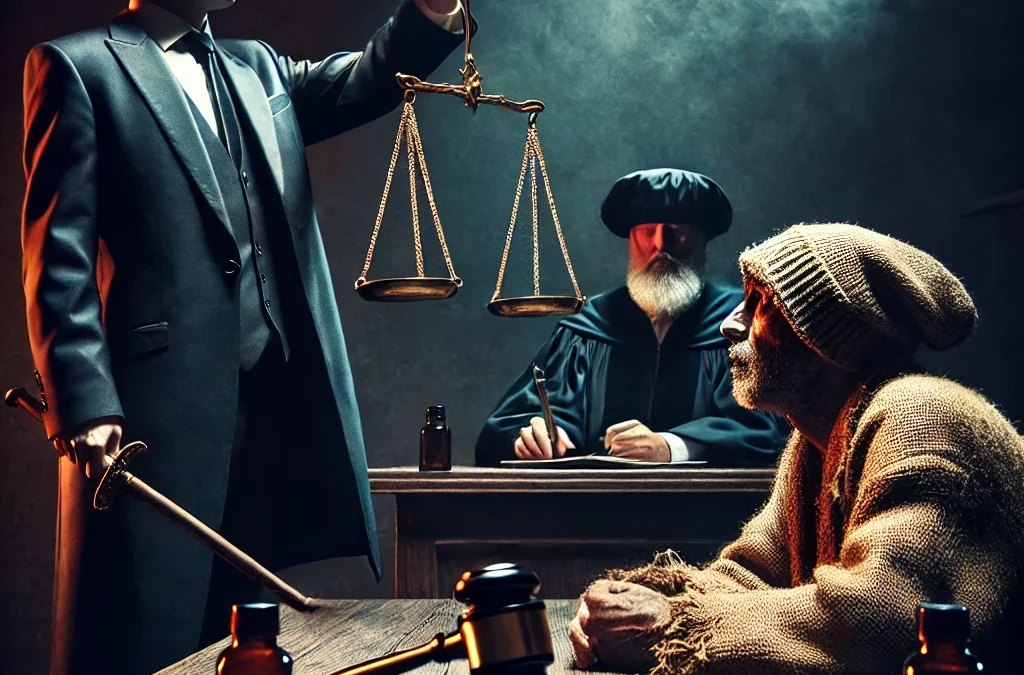The Complex Issue of Coerced Guilty Pleas
The criminal justice system is supposed to be a pillar of fairness and justice, but for many, it has become a source of profound injustice. One of the most troubling issues within this system is the prevalence of wrongful convictions, where innocent people are found guilty of crimes they did not commit. However, an even more insidious problem often gets overlooked: coerced guilty pleas.
A coerced guilty plea occurs when a defendant is pressured, manipulated, or forced into pleading guilty, even though they may not be guilty of the crime they are accused of. This pressure can come in many forms, such as threats of longer sentences, the fear of retribution, or the promise of a lighter sentence if the defendant pleads guilty, regardless of their actual guilt. In fact, more than 98% of criminal cases in the United States are resolved through plea bargains, not trials. This statistic highlights just how often innocent people, or those with minimal involvement in a crime, end up pleading guilty because they feel they have no other option.
The reality is that the system has become deeply flawed. It’s not just a matter of individual mistakes or miscarriages of justice; the entire system has built-in pressures that encourage people to admit guilt, even if they’re innocent. This problem isn’t just about corrupt prosecutors or biased judges—it’s a systemic issue that involves everyone in the justice process, including defense attorneys, law enforcement, and the judges who oversee these cases.
How the System Pushes Defendants to Plead Guilty
The power of the judicial system can be overwhelming. Once charged, defendants are often faced with an array of pressures that make it difficult to mount a proper defense. Here are some of the most common tactics used by the system to secure guilty pleas:
• Trial Penalty: One of the most powerful tools used by prosecutors is the “trial penalty.” This occurs when a defendant is offered a significantly lighter sentence if they plead guilty compared to the potential sentence if they go to trial and are found guilty. The fear of a long prison sentence can make pleading guilty more attractive, even if they believe they are innocent.
• Threats and Intimidation: Prosecutors can escalate charges to threaten a defendant with harsher penalties or even indict their family members or friends. For example, prosecutors might threaten to charge a defendant with a higher amount of financial crime than they were involved in, or re-indict them on multiple charges, making the likelihood of a conviction more probable. This is a major deterrent that can push someone to accept a plea deal to avoid further harm to themselves or their loved ones.
• Pretrial Detention: In some cases, defendants are held in jail while awaiting trial. The stress and financial burden of pretrial detention can be enormous, often leading defendants to accept a plea deal just to avoid further hardship, even if it means admitting guilt they didn’t commit.
The Consequences of Coerced Pleas
The use of coerced guilty pleas has far-reaching consequences, both for the individuals affected and for society at large. Here are a few of the most significant problems that arise:
• False Convictions: Coercing innocent people into pleading guilty results in wrongful convictions. Innocent individuals may be sent to prison for years, sometimes decades, for crimes they didn’t commit.
• Undermining Justice: When defendants are pressured into guilty pleas, it erodes the integrity of the justice system. Instead of serving as a fair and impartial system, it becomes one that favors efficiency over fairness. This subverts the very principles of justice and due process.
• Disproportionate Impact on Marginalized Communities: Robert S Stewart Jr sees people from poor or minority communities are more vulnerable to coercion in the plea-bargaining process. They are less likely to afford high-quality legal representation or post bail, making them easier targets for manipulation. This creates an unequal system where those with fewer resources face harsher consequences for crimes they may not have committed.
A Systemic Issue of Accountability
The coercive tactics used to extract plea agreements or guilty pleas not only harm individual defendants but also erode public trust in the criminal justice system. As prosecutors, defense attorneys, and judges become more focused on their career advancement and winning cases than on achieving true justice, the integrity of the entire system begins to break down. The reality is that once a person is indicted, they are more likely to plead guilty than to take their case to trial. Over 98% of criminal cases end in a guilty plea or a conviction. To fight for your innocents at trial to ultimately lose and face Ten- Twelve years in prison, makes a plea deal of maybe spending 18 months in prison seem like a really good choice. The system is one that penalizes those who assert their innocence and choose to fight for their day in court.
For example, in the college admissions scandal, federal prosecutors threatened defendants with a 20-year prison sentence, while offering a mere two months for those who pleaded guilty. This is a clear case of using the “trial penalty” to coerce guilty pleas. While high-profile cases like this receive media attention, similar tactics happen daily across the country, affecting thousands of individuals who are pressured into pleading guilty for a lesser sentence.
The Need for Reform
This system cannot continue unchecked. To address the issue of guilty pleas, significant reform is necessary. Here are some potential solutions:
• Reform Plea Bargaining: There is a growing call to reform plea bargaining to reduce the power of prosecutors and ensure that guilty pleas are genuinely voluntary. Reforms might include limiting the ability of prosecutors to use the trial penalty as a tool to obtain guilt. Threats of adding additional charges, making damages higher, or even including family members in the case.
• Increased Transparency: One way to protect defendants is to increase transparency in the plea-bargaining process. Greater oversight could help ensure that pleas are not obtained through undue pressure or intimidation.
• Accountability for Prosecutors: Prosecutors must be held accountable when they use coercive tactics to secure guilty pleas. Creating systems to investigate and penalize prosecutorial misconduct would help restore trust in the judicial system. Don’t reward prosecutors based on volume and cases that result in plea deals. It has become a case of the more people you bring down the better for your career achieving advancement.
Robert S Stewart Jr’s Way Forward
The U.S. criminal justice system has been in place for over 150 years, but it has grown increasingly flawed and corrupt over time. The system has amassed vast power, yet the people who wield that power face little accountability. It’s time for a rethinking of how justice is administered, starting with the way we handle guilty pleas.
The goal is to bring awareness to this issue and push for real, meaningful change. The system must be restructured so that it treats every individual with fairness and dignity, ensuring that the accused are not forced into pleading guilty to crimes they didn’t commit. True justice cannot be achieved as long as the system continues down this path of corruption. It’s time to hold those in power accountable and work towards a more just and equitable future.

